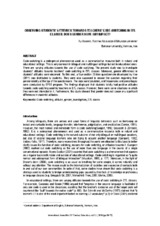Observing students’ attitudes towards teachers’ code-switching in EFL classes. Does gender have any impact?
Autor
Asghar, Ali
Abusaeedi, Rostami
Jafarian, Malakeh
Editor
Universidad de Córdoba, UCOPressFecha
2016Materia
Code-switchingAttitude
Gender
Investigation
EFL clases
METS:
Mostrar el registro METSPREMIS:
Mostrar el registro PREMISMetadatos
Mostrar el registro completo del ítemResumen
Code-switching is a widespread phenomenon used as a communicative resource both in natural and
educational settings. This is very common in bilingual and multilingual settings but not in educational ones.
There are varying attitudes towards the use of code switching. The present study was to investigate
students’ attitudes towards teachers’ code-switching in EFL classes. Moreover, gender differences in
students’ attitudes were observed. To this end, a four-section 20-item questionnaire developed by Yao
(2011) was distributed to students. They were also supposed to answer the question regarding their
gender identity at the top of the questionnaire. The data were tabulated, and frequencies and percentages
were conducted by SPSS program. The findings displayed that students totally had positive attitudes
towards code-switching used by teachers in EFL classes. However, there were some situations in which
they were not interested in it. Furthermore, this study showed that gender does not cause any significant
differences in students’ attitudes.

